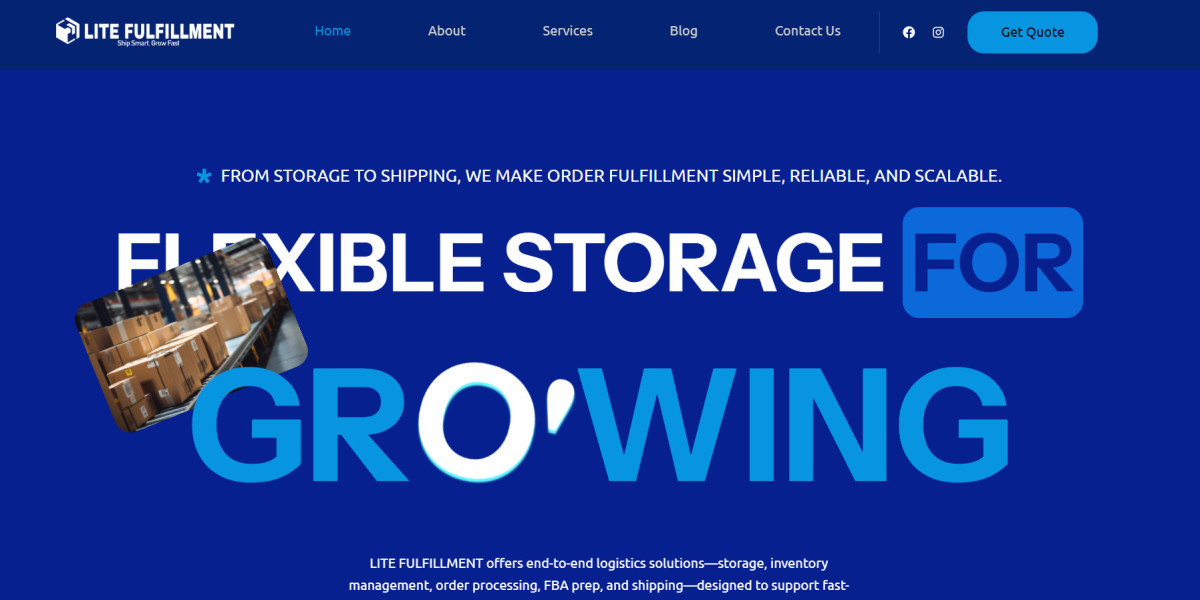If you’re selling on Amazon, Amazon FBA Prep isn’t just another task—it’s the backbone of smooth logistics, faster deliveries, and higher seller ratings. Whether you’re using Amazon’s internal workflow or sending inventory through a fulfilment center in USA, proper prep ensures your products are compliant, protected, and ready to win the Buy Box.
⭐ What Is Amazon FBA Prep?
Amazon FBA Prep refers to the full set of preparation steps required before products are shipped to Amazon warehouses. This includes:
Labeling
Packaging
Poly-bagging
Bundling
Barcoding
Inspection
Quality checks
Shipment planning
If you don't follow Amazon’s prep standards, your inventory may be rejected, delayed, or given non-compliance fees—which can damage your entire supply chain.
? Why FBA Prep Matters for Sellers
Amazon’s ecosystem is strict, and proper prep ensures:
Your products arrive without damage
Amazon accepts your inventory without delays
Your listings remain eligible for Prime
You avoid unplanned service fees
Faster inbound receiving
Better customer satisfaction → higher ranking
For sellers scaling through a fulfilment center in USA, prep becomes even more critical because each center must meet Amazon's packaging rules before shipment.
? Core Components of Amazon FBA Prep
To help you optimize your workflow, here’s a detailed breakdown of every requirement Amazon expects.
1. Product Labeling
Amazon uses barcodes to track items across all fulfillment centers. Each unit requires:
FNSKU barcode (unique to each seller)
Scannable placement
No smudges or damage
Covered manufacturer barcodes
Pro Tip: Keep label placement consistent on all units to speed up Amazon receiving.
2. Packaging & Protection
Amazon evaluates packaging durability based on drops, compression, and shelf life.
Common requirements include:
Bubble-wrap for fragile items
Poly bags with legal suffocation warnings
Double-wall boxes for heavy units
Shrink wrapping for bundles
Secure lids and sealed containers
Amazon may reroute inventory if packaging fails durability tests.
3. Pre-Shipment Inspection
Quality control prevents returns, bad reviews, and listing suppression.
QC usually checks:
Correct product
No defects
Accurate variations (size, color, model)
Working functionality
Exact bundle quantity
Strong QC = fewer issues at the warehouse + higher customer trust.
4. Bundling & Multi-Pack Prep
If you're selling bundles, Amazon requires:
“Sold as Set” labels
“Do Not Separate” stickers
Clear packaging with visibility of the entire set
Bundles are often used to boost average order value and stand out from competitors.
5. Compliance & Safety Requirements
Depending on your product category, Amazon may require:
Hazmat documentation
Expiry dates
Country-of-origin marking
Suffocation warnings
FDA or certification checks (for some categories)
Staying compliant protects your seller account from suspensions.
? Amazon FBA Prep Workflow (Step-by-Step Checklist)
| Step | Task | Why It Matters |
|---|---|---|
| 1 | Product inspection | Avoids defective inventory shipping |
| 2 | FNSKU labeling | Ensures Amazon recognizes your inventory |
| 3 | Bagging/wrapping | Product protection and compliance |
| 4 | Boxing & carton labeling | Prevents damage in transit |
| 5 | Shipment creation | Amazon inbound routing |
| 6 | Palletizing (if required) | Smooth warehouse unloading |
| 7 | Carrier pickup | Inventory movement to Amazon |
This workflow helps avoid inbound delays and compliance errors.
? Choosing the Right Amazon FBA Prep Option
Sellers typically choose from these three methods:
A) Prepping Yourself
Good for beginners with low inventory volume.
Cons: Time-consuming, error-prone.
B) Hiring Amazon's Prep Services
Convenient but can become expensive due to per-unit pricing.
C) Working With a Third-Party Prep Partner
Especially valuable when using a fulfilment center in USA for cost-efficient storage, inspection, and fast deliveries.
⭐ Benefits of Outsourced Amazon FBA Prep
Reduced workload
Faster inbound processing
Lower storage and labor costs
Avoiding Amazon non-compliance fees
Scalable operations for high-volume sellers
? Amazon FBA Prep Requirements for Different Product Types
Amazon has category-specific rules. Here’s a simplified table:
| Product Type | Prep Requirement |
|---|---|
| Fragile items | Bubble wrap + “Fragile” label |
| Liquids | Double-sealed + leak-proof bag |
| Textiles | Poly bag + barcode visible |
| Sharp objects | Protective covering + secure packaging |
| Toys (unboxed) | Bagging + suffocation warning |
| Supplements | Expiry date + factory seal |
| Bundles | Clear set labeling + secure packaging |
? Best Practices for Smooth Amazon FBA Prep
Follow these expert tips to reduce delays and returns:
✔ Use barcode printers for accuracy
Blurry or damaged barcodes trigger delays.
✔ Maintain inventory documentation
Helps solve reconciliation issues faster.
✔ Conduct random product audits
Catches defects before reaching warehouses.
✔ Keep units lightweight
Less shipping cost + better customer experience.
✔ Use carton templates
Ensures each SKU has standardized box specs.
? Amazon FBA Prep for International Sellers
If importing from overseas:
Use prep centers near ports for faster handling
Pre-inspect at the origin and destination
Make sure barcodes match EXACTLY with listings
Ensure packaging complies with Amazon USA standards
Using a fulfilment center in USA eliminates international shipping delays for small-volume inbound shipments.
? Cost Structure of FBA Prep (General Market Rates)
| Service | Typical Cost Range |
|---|---|
| Labeling | Per unit charge |
| Bagging | Per unit charge |
| Bubble-wrapping | Per unit charge |
| Bundling | Per bundle charge |
| Inspection | Per unit or per hour |
| Carton forwarding | Per carton fee |
| Storage | Per cubic foot |
Actual pricing varies by location, storage season, and SKUs.
? Tools You Can Use for Efficient FBA Prep
(Not brand promotion—only general categories)
Barcode printers
Digital scales
Heat sealers
Industrial tape guns
Poly bags with warnings
Box cutters
Shipping label printers
Using consistent tools reduces prep time significantly.
❓ Frequently Asked Questions (FAQs)
1. What happens if my items arrive at Amazon without proper prep?
Amazon will charge unplanned prep fees, reject the shipment, or even deactivate the listing.
2. Do all products need FNSKU labels?
Yes, unless enrolled in manufacturer barcode programs.
3. How long does prep typically take?
Smaller batches: 1–2 days
Large batches: up to a week depending on complexity.
4. Can I send products directly from suppliers to Amazon?
Only if the supplier can meet Amazon prep standards—but most cannot, which is why many sellers use prep centers.
5. Are prep centers worth it?
Yes, especially for high-volume sellers or anyone wanting time freedom.








